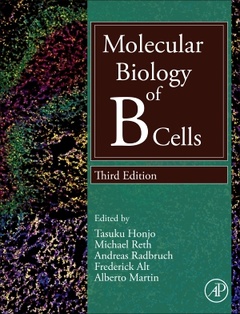Molecular Biology of B Cells (3rd Ed.)
Coordonnateurs : Honjo Tasuku, Reth Michael, Radbruch Andreas, Alt Frederick, Martin Alberto

Joseph S. Lucas, Cornelis Murre, Ann J. Feeney and Roy Riblet
2. The Mechanism, Regulation and Evolution of V(D)J Recombination
David G. Schatz, Yiwen Zhang, Jianxiong Xiao, Shan Zha, Yu Zhang and Frederick W. Alt
3. The Origin of V(D)J Diversification
Ellen Hsu and Susanna M. Lewis
4. The Variable Lymphocyte Receptor B System of the Jawless Vertebrates
Thomas Boehm, Max D. Cooper, Masayuki Hirano, Sabyasachi Das, Ryo Morimoto and Jonathan P. Rast
5. Structure and Signalling Function of the B-Cell Antigen Receptor and Its Coreceptors
Michael Reth, Kathrin Klasener, Lars Nitschke and Michael R. Gold
6. Fc Receptors
Jeffrey V. Ravetch and Stylianos Bournazos
7. Transcriptional Regulation of Early B-Cell Development
Ashley P. Ng, Rhiannon Morris and Stephen L. Nutt
8. Relationship between B-Cell Populations, Development and Function of B-Cell Subsets
Eva Piano Mortari and Rita Carsetti
9. B-Cell Development to Immunity and Tolerance
Fritz Melchers, Mir-Farzin Mashreghi and Peter K. Jani
10. The Role of the BAFF and Lymphotoxin Pathways in B Cell Biology
Fabienne Mackay and Jennifer L. Gommerman
11. Mechanism and Regulation of Immunoglobulin Class Switch Recombination
Fei-Long Meng, Lekha Nair, Keith C. Fernandez, Uttiya Basu and Jayanta Chaudhuri
12. Somatic Hypermutation
Jana Ridani, Philip Barbulescu, Alberto Martin and Javier M. Di Noia
13. Molecular Mechanism of Activation-Induced Cytidine Deaminase
Nasim A. Begum, Maki Kobayashi, Hitoshi Nagaoka and Tasuku Honjo
14. Molecular Pathogenesis of B-Cell Lymphomas
Laura Pasqualucci, Pantaleo De Simone and Riccardo Dalla-Favera
15. Human Immunodeficiencies Caused by Inborn Errors of B-Cell Development or Function
Stuart G. Tangye, Jean-Laurent Casanova and Cindy S. Ma
16. Memory B Cells and Plasma Cells
Mairi Anne McGrath, Florian Weisel, Andreas Radbruch and Mark Shlomchik
17. Homoeostatic Versus Pathogenic Autoantibodies: Origin, Structure and Effector Functions
Yemil Atisha-Fregoso, Rita Pozovskiy, Shabirul Haque, Manami Watanabe, Yong-Rui Zou and Betty Diamond
18. Anti-Tumour Necrosis Factor and New Paradigms for Therapies Using Antibodies
Sergei A. Nedospasov, Marina S. Drutskaya and Andrey A. Kruglov
19. Therapeutic Targeting of B Cells and Plasma Cells with a Focus on Multiple Sclerosis and Other Autoimmune Conditions
Andreia C. Lino and Thomas Dorner
20. IMGT Immunoglobulin Repertoire
Analysis and Antibody Humanization Marie-Paule Lefranc
21. Mucosal Immunity to Bacteria and Immunoglobulin A Synthesis
Andrew J. Macpherson, Tim Rollenkse, Lucia M. Kato and Sidonia Fagarasan
22. B-Cell Metabolism
Julia Jellusova
Dr. Tasuku Honjo graduated from Kyoto University Faculty of Medicine in 1966 (M.D.). After obtaining his Ph.D. in Biochimistry (Dr. O. Hayaishi), he spent 4 years in the U.S.A. as a postdoctoral fellow first in Carnegie Institution of Washington (Dr. D. Brown), and then in NIH (Dr. P. Leder) where he initiated studies on immunoglobulin genes. He returned to Tokyo University as an assistant professor in 1974, and then moved to Osaka University School of Medicine as Professor of Genetics in 1979. He succeeded to Dr. O. Hayaishi after his retirement at the Department of Medical Chemistry in Kyoto University. He also served as Dean of Medical School (1996-2000 and 2004-2005), and Executive Member of Council for Science and Technology Policy, Cabinet Office (2006-2012). Currently, he is Professor of Department of Immunology and Genomic Medicine, Kyoto University, and also Chairman of Board of Directors, Shizuoka Prefectural University Corporation.
Dr. Honjo is well known for his discovery of activation-induced cytidine deaminase that is essential for class switch recombination and somatic hypermutation. He has established the basic conceptual framework of class switch recombination starting from discovery of DNA deletion (1978) and S regions (1980), followed by elucidation of the whole mouse immunoglobulin heavy-chain locus. His contribution further extended to cDNA cloning of IL-4 and IL-5 cytokines involved in class switching and IL-2 receptor alpha chain. Aside from class switching recombination, he discovered PD-1 (program cell death 1), a negative coreceptor at the effector phase of immune response and showed that PD-1 modulation contributes to treatments of viral infection, tumor and autoimmunity. In addition, he is known to be a discoverer of RBP-J, a nuclear protein that interacts with the intracellular domain of Notch in the nucleus. Notch/RBP-J signaling has been shown to regulate a variety of cell lineage commitment including T and B cells.
For
- Provides new research on normal versus abnormal B cell development and function
- Contains studies on therapeutic antibodies in cancer and infectious diseases
- Covers research on therapeutically targeting B cells in inflammation or autoimmune diseases
Date de parution : 01-2024
Ouvrage de 548 p.
21.4x27.6 cm
Thèmes de Molecular Biology of B Cells :
Mots-clés :
Ig genes and their rearrangements; Control of B cell development Evolution of B cell receptors; Mechanism of B cell receptor signaling; Regulation of class switching and somatic hypermutation by AID; Maintenance and memory of the B cell system; Mucosal immune response: symbiotic regulation of gut microbiota; Application of antibodies for treatment of cancers; HIV and inflammatory diseases; Antibodies; Biologicals; Bone; Immunity; Mutation; Lymphoma



